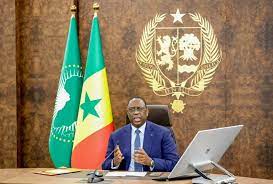APA-Dakar (Senegal) Controversial from start to finish, outgoing President Macky Sall’s amnesty bill was passed without a hitch by the National Assembly, at the end of an eventful day.
After more than ten hours of epic debate, the bill to grant amnesty for criminal and correctional offences committed between February 2021 and February 2024 during political demonstrations was voted on Wednesday 6 March in the National Assembly. It was passed with 94 votes from the majority and part of the parliamentary opposition, while 48 MPs voted against the law and two of their colleagues abstained.
The new amnesty law allows a large number of people detained in Senegalese prisons, including the well-known opposition figure Ousmane Sonko and his candidate in the presidential election on 24 March, Bassirou Diomaye Faye, to regain their freedom and return home within the next few hours.
Several opposition MPs, particularly those close to former Dakar mayor Khalifa Sall, initially voiced their rejection to the bill, which was defended by the Minister of Justice, Aissata Tall Sall.
Babacar Mbengue believes that the bill should be “reconsidered and withdrawn quite simply” because, in his view, it absolves the criminal acts that took place in Hann Bel-Air, a commune in the Dakar suburbs of which he is the mayor. He is referring to the Molotov cocktail attack on a public transport bus that claimed the lives of two young
girls last August, the day after the mayor of Ziguinchor (south) was remanded in custody, leading to further violent demonstrations.
“Political use of amnesty”
Supporting his fellow member of the Taxawu Senegal coalition, MP Babacar Abba Mbaye noted that President Macky Sall “is responsible for all this chaos” because he had promised at the very start of his term of office that he would “reduce the opposition to its simplest form.”
When he proposed such a bill, the MP and presidential candidate Pape Djibril Fall, denouncing “the political use of amnesty,” said that “you don’t decree national reconciliation, you enact it.”
Aissata Tall Sall explained during the work of the Law Commission the previous day that “this bill (was) not intended for President Macky Sall, the demonstrators or those in detention,” as some critics had led others to believe when they claimed that the Senegalese leader was “dealing” or “negotiating” with Ousmane Sonko.
“This text is for the future of Senegal” in line with Macky Sall’s desire to “pacify” the socio-political arena before he leaves power on 2 April, the deadline for his second term, the Minister of Justice argued.
To this end, almost all of the 25 MPs from Sonko’s PASTEF party (now disbanded), whose position on the bill was eagerly awaited, indicated during the discussions that they were not opposed to a legislative mechanism that would allow the release of “political detainees,” provided that the minister specified whether “blood crimes” were
included in the scope of the amnesty law.
“Since January 2021, we have spent 240 million CFA francs on lawyers’ fees and hospitalisation costs” for the victims of the demonstrations and other detainees espousing the ideology of PASTEF, a sovereignty party founded by Ousmane Sonko in 2014 with state officials, explained Ayib Daffe, using the parliamentary forum to denounce the “occasional lawyers” for the victims of the demonstrations.
Reconciliation and forgiveness
In the end, the PASTEF MPs and more generally those from the Yewwi Askan Wi (Free the People) coalition did not vote in favour of the bill, even though Aissata Tall Sall tried to shed light on all the issues they had raised.
“I am well aware that this is not an easy job. Amnesty laws are always divisive,” Aissata Tall Sall admitted, replaying various chilling scenes from recent political demonstrations: the father of the two girls burnt to death on the bus, who said he was “entrusting himself to God” when she contacted him to offer her condolences, the policeman
who fell in the face of the fury of the demonstrators and preferred to “holster” his “pistol” before plunging into a “coma,” the student Prosper Senghor from the University of Saint-Louis (north of France) who received a “tear gas grenade” in the chest before succumbing to his injuries a few days later, just as his father had finished “saving
money” so that he could continue his studies in mathematics.
In view of all these distressing examples, she suggested that MPs follow the path of forgiveness and national reconciliation outlined by President Macky Sall.
“We have a duty to come together as Senegalese and to rise above the past,” Ms. Sall advised, pointing out to PASTEF MPs that “all criminal offences and other misdemeanours are covered by the scope of the law,” as stated in article one of the bill.
On the other hand, “all victims will be assisted” through a compensation mechanism to be determined by “the state (which) will be at their side,” said Ms. Tall Sall a few minutes before President Macky Sall was to dismiss the government.
ODL/ac/fss/as/APA


